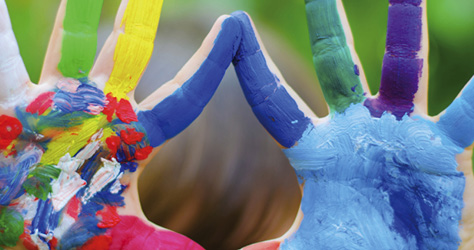There’s no one quite so busy as a two-year-old: exploring, running, fiddling, roly-polying and lots more.
Get ready to be active with them...
At a glance
- They'll get chatty and pick up new words
- They may be slimming out a bit as they are always running around
- If little ones are becoming clingy, explore things with them

The art of conversation
Well, perhaps not yet tea-party-at-the-Ritz standards, but most two-year-olds are beginning to put two words together - ‘Mummy cup’, ‘Daddy bye bye’, ‘Nana car’. This happens once they’ve got a solid vocabulary of 50 or so words.
Around now they will have what speech therapists call their ‘language explosion’ when they’re learning new words at a dizzying rate. It’s exciting to watch.
They’ll also refer to themselves a lot more (by their name rather than ‘I’ or ‘my’) – what they’re doing, what they like, what they don’t like.
Busy, busy
There’s no one quite so busy as a two-year-old: exploring, running, fiddling, roly-polying...
The Government advises that once your little one is walking, they should get three hours of physical activity a day. That sounds like a lot, but it includes ‘light’ activities like walking, rolling and standing up as well as more active play like scooting or cycling, chasing games and ball games.
It doesn’t have to be all at once – it can be spread through the day. It will help build strong bones and muscles, improve balance and co-ordination and help them stay at a healthy weight.
The cling-ons
You imagined your two-year-old strolling confidently into a playgroup and zapping off to play while you relaxed with a coffee – yet they’re clinging to your jeans and refusing to let go. This is completely normal.
Learning to be social takes time and practice. Opt for one-on-one play dates first to build up their tolerance, then try smaller, quieter gatherings before going for the full play-barn monty!
It could take several sessions before your little one will leave your side; first explore things with them and gradually they will be happy to stray from your side. Stay in sight though, as they will want to ‘touch base’ with you every few minutes.
New fears
Most two-year-olds go through a phase of demonstrating fears around things like thunderstorms, the dark, monsters and spiders. Try not to make a big deal out of it. Reassure your child with words and a hug and then distract them. You may find the topic keeps coming up long after the fear has gone: again, reassure and then distract.
Changing shape
Your little one is fast losing their lovely, squidgy baby look: their head no longer looks big compared to the rest of their body, their legs and arms have lengthened, and they’re slimming out a bit because of all that running around.
How you can help
- Be patient if they throw their toys to the ground in frustration. This controlling-your-emotions lark is a way off yet
- They will love helping you with household chores: use it as a learning experience – count socks, sort laundry into colours, sing songs while you clean
- Play lots of physical games – tickling, chasing, throwing balls
- Get outside to play as much as possible. It calms and de-stresses them and the fresh air will tire them out (in a good way). Messy play with clay/soil/sand is great for developing their senses, creativity and inquiring mind
- Encourage pretend games to stimulate their imagination – tea parties, teddy in a cardboard spaceship etc
- Get crafty with painting, drawing and stickers, which promotes good fine motor skills, and praise their efforts.
They're all different
A small note on developmental milestones: it’s really true – all toddlers are different and although we can encourage them, they will do things at their own pace and in their own time.
You can see more about your toddler's development with our milestones chart.
If you have any concerns, talk to your health visitor. At 2 to 2-and-a-half years your child will have another health and development review. This is usually done by a nursery nurse or health visitor, and may happen at your home, baby clinic or the children's centre.